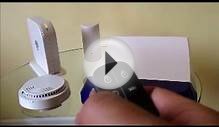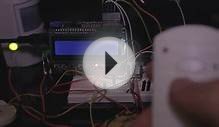
 Home security systems are designed to minimize the risk of break-ins and protect families from crime. With home automation, wireless connectivity, and cellular alarm systems, home security technology has reached new heights. From turning on lights to activating the alarm system, now homeowners can manage their security system from anywhere wirelessly. This is indeed great news for homeowners but the latest home security technology is a double-edged sword. Home security systems have a number of vulnerabilities that shouldn’t be ignored.
Home security systems are designed to minimize the risk of break-ins and protect families from crime. With home automation, wireless connectivity, and cellular alarm systems, home security technology has reached new heights. From turning on lights to activating the alarm system, now homeowners can manage their security system from anywhere wirelessly. This is indeed great news for homeowners but the latest home security technology is a double-edged sword. Home security systems have a number of vulnerabilities that shouldn’t be ignored.
Imagine coming back to a ransacked home. Your security system is still activated, the alarm never went off and you never received any notification, so what happened?
You’d be surprised to know that burglars can bypass your security system with simple hacking tools. Yes, security systems can be hacked into just like computers. A burglar can hack into your security system, deactivate the alarm, enter your house and get away with the goods without leaving a trace.
According to an article published by Forbes, video surveillance systems and DVRs are vulnerable to hacks. Hackers can easily gain access to the control of surveillance camera feeds and deactivate the system. This calls for preemptive measures.
Fortunately, there are a few simple tricks that can prevent burglars from hacking your security system. Take a look:
Secure passwords
A weak password is like giving a burglar the keys to your home. When you install a security system, the first thing you should do is change the default password. You should choose your password wisely which isn’t easy to guess. Make sure your password is a combination of symbols, letters and numbers.
Secure your router
If you use a WiFi network for your home security system, always keep it protected with a password. Avoid using birthdays and phone numbers as your password.
Install a system with encrypted signals
When purchasing a wireless home security system, make sure you select a system which has encrypted signals. A system with unsecured encryptions can be accessed by external sources easily. You can also opt for additional tamper resistance features.
Install antivirus software
You can install antivirus software on computers that access your security system. Firewalls and antivirus programs can help detect any threat of viruses and malware.
Limit non-approved devices
You can limit the number of devices that can be used to access your home security system. Your laptops, smart phones and desktop computers should be the only devices that can log into the security system.
Never use public WiFi
It is recommended that you use a secure network when accessing your home security system from a remote location. Using a public WiFi network can increase the hacking risk. Hackers can use public WiFi networks to access personal information such as email IDs and passwords.
Keep a check on your camera logs
If you have a surveillance system at home, protect it from being hacked by regularly checking the IP history of the system. This will help you know if a stranger has tried to access your surveillance system from an unidentified or unknown IP address. Also, avoid purchasing used camera systems as they may carry an implantable device that can be used by burglars to hack into the system.
Regularly change your passwords
To enhance safety, change the password of your home security system regularly. Using an outdated password may make your security system vulnerable to hacks.
Opt for wired security systems
Though this may seem a hassle, there is minimum risk of hacking involved with wired security systems. Installing a wired security system may be a good idea for homeowners who are planning to relocate soon.
RELATED VIDEO











